

Life Writing. Collage by Sonja, from Vija Celmins, “Eraser,” 1967, acrylic on balsa wood, Collection of the Orange County Museum of Art.

For a long time, I’ve wanted to keep a diary. I tried throughout adolescence but always gave it up. I dreamt of being very frank, like Joe Orton, whose diaries I admired very much; I found them in the library when I was about 14. How To Pitch Stories To Code Switch : Code Switch. Like every team of reporters and editors at a major news outlet, Code Switch gets a lot of pitches for stories, and we can only greenlight a small percentage of them.

The majority are from publicists interested in having us cover one of their clients. But we also get a healthy stream of pitches from potential freelancers. Having done freelance work, I know the pitching process can seem like a black box. Llegir i escriure articles d'opinió. How to Be a Better Writer: 6 Tips From Harvard’s Steven Pinker. U want 2B a better writer?
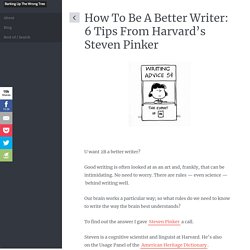
Good writing is often looked at as an art and, frankly, that can be intimidating. No need to worry. There are rules — even science — behind writing well. Our brain works a particular way; so what rules do we need to know to write the way the brain best understands? To find out the answer I gave Steven Pinker a call. Steven is a cognitive scientist and linguist at Harvard. Steven was recently ranked as one of the top 100 most eminent psychologists of the modern era. His latest book is The Sense of Style: The Thinking Person’s Guide to Writing in the 21st Century. Below you’ll learn: The two key elements that will improve your writing.The biggest mistake we all make — and how to fix it.The science behind what makes writing work.The most pleasant way to improve your knowledge of grammar. Write or Die: the software that offers struggling authors a simple choice. This is horrible!

The novelist David Nicholls says that while working on his latest book Us he used a piece of software called Write or Die, which starts to delete what you are writing if you pause for too long. “I was convinced that there was a novel in me and I had to just spew it out on to the page,” Nicholls told an audience at the Cheltenham Literary festival. “I produced huge piles of paper and I saw it was all rubbish. It was as if I was writing with a gun to my head.” Three anti-social skills to improve your writing - Nadia Kalman. E.B.
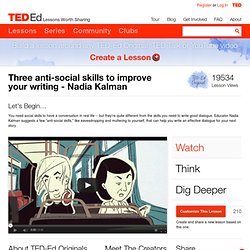
White wrote, “The best writing is rewriting.” With that idea in mind, look at a few of the examples of ineffective dialogue in the blog post, “Bad Dialogue – Bad, Bad Dialogue,” by Beth Hill, at Now, select one example to rewrite and improve. 30 Incorrectly Used Words That Can Make You Look Horrible. Download - Ommwriter. Write for. A lot of what makes Cosmopolitan such a brilliant place to work is the HUGE connection it has with its readers.

We get emails from you every single day, and love your comments on Twitter and Facebook, ranging from the witty and hilarious to the truly considered and impactful. So we're inviting you to bring those skills onto Cosmopolitan.co.uk and write for us. Write for. Study work Gap Programmes. Writing Advice. Well, first off, boring writing covers a multitude of sins.
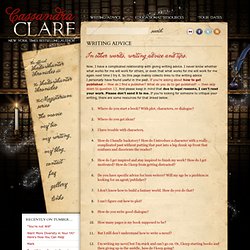
Without looking at your writing (which I can’t do), I can’t tell you why it’s boring exactly, any more than if you call up a doctor and tell her you don’t feel well, she can tell you what’s wrong with you exactly. The differential, so to speak, is vast. This is why you need someone — a teacher, friends, ideally a class of writing students — reading your work and giving you feedback. Foreshadowing. Examples[edit] An example of foreshadowing from the book trilogy and its screen adaptation The Lord of the Rings:[6] —Frodo: What a pity that Bilbo did not stab that vile creature [Gollum], when he had a chance!

—Gandalf: Pity? It was pity that stayed his hand. [...] Many that live deserve death. This conversation foreshadows the fact that later in the story Frodo himself pities Gollum and is unable to kill him. Character Names - Tips for Writers on Naming Characters. There are many literary and movie characters that become everlasting brands in our culture—Atticus Finch, 'Ratso' Rizzo, Holden Caulfield and Scarlett O'Hara, for example.
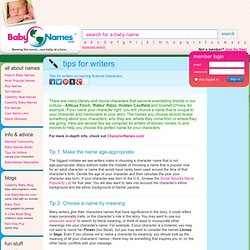
If you name your character right, you will choose a name that is unique to your character and memorable to your story. The names you choose should reveal something about your characters: who they are, where they come from or where they are going. Here are several tips we compiled for writers of stories, novels, tv and movies to help you choose the perfect name for your characters. Name That Character! By Anne Marble A character's name is a basic part of that character, but it can sometimes be hard to come by just the right name.
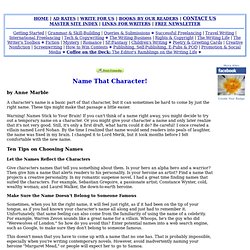
These tips might make that passage a little easier. Warning! Ways to Know If Your Novel Idea Is Novel-Worthy. The short story and the novel differ in many ways, but the most important consideration is the time commitment involved. While it's relatively uncommon for a writer to work consistently on a short story for years, the average novel takes 3-7 years to complete. If you're going to commit that much of your life to a project, you obviously want to be sure your novel idea is a good one. So how do you know if your idea is novel-worthy? A few questions will help you decide. 1. It may sound simplistic, but for many people, plot is one of the hardest elements to grasp. 2. If you're reading this article, you probably do care about your audience. Beware the Mary Sue Character - Fiction Writing. In a nutshell, the Mary Sue character is beautiful, talented, brilliant – and nice, which means that everyone loves her.
And I mean everyone, except for the obviously inferior villain. But the Mary Sue’s modesty makes her unaware of her own perfection and everyone else’s devotion to her, so she worries about whether people like her. Meanwhile, she has a few minor “faults” such as slight clumsiness or big feet. The Big Cover-Up: A Writer’s Role in Book Jacket Design. Walt Whitman didn't have an art director like Gall. When he first published Leaves of Grass, in 1855, he chose the stamped floral design that framed the book's title himself.
Whitman is among the many authors who, by invitation or necessity, have designed their own covers. Evelyn Waugh came up with the jacket designs for the first editions of his novels Decline and Fall (Chapman & Hall, 1928) and Vile Bodies (Chapman & Hall, 1930). In 1937, J. R. Novelist Elizabeth Evans has published novels with both small presses and large publishers, and she has designed her own covers for both. Oached Pish - From notes to novel. All this month Justine Larbalestier has been answering questions about the process of writing from her readers. It's so interesting reading about others' processes: sometimes it's a relief when someone has as one-legged-rooster-riding-a-rocking-chair messy an approach as I have; other times it's fascinating when someone has a process that obviously works, but seems totally alien to my brain.
Anyway, she shared this question, as the person's process differs from hers so much: Can You Make Money Writing Novels? Can anyone write novels? There are no educational or social requirements to becoming a novelist. Education helps you develop writing skills and get involved in the community of writing, but it is not a requirement for success. The main requirement is that you write a novel. The better written and more marketable your novel is, the better your chances. In the end, the elements that lead to the successful marketing of a novel have little to do with educational or social background.
Publishing Money Myths. Note: This article originally appeared on my blog in June 2008, and then was revised and expanded for the Feb. 2009 Romance Writers Report magazine. Editorial Ass: And You Thought a Royalty Involved a Crown. My mother has read and loved a particular book I edited. Last week, she asked, out of curiosity, how much money that favorite author of hers might make off the book. John Scalzi’s Utterly Useless Writing Advice. How to rewrite. I get a lot of beginning writers asking me how to rewrite. Too Young to Publish. Persons of Interest. 2: The Zen of First (Zero) Drafts. This is the most important tip of all: It’s only a first draft, it doesn’t have to be perfect. JWAM reader request no. 9: Plot similarities.
AlisonG Says: I’m working on my first YA novel, and have (of course) discovered two other books that have similar plots. Damned if You Do, Damned if You Don’t. Lately, I have heard several published white writers express their trepidation about the idea of writing non-white characters. The Swivet: All new & revised: On word counts and novel length.
DISCLAIMER: This post was written in 2008, and revised in 2010. The publishing industry has changed drastically in that time, and word counts aren't nearly as rigid nor as important as they once were, especially for writers who are now producing e-original content. Additionally, novellas are now routinely being published by larger publishers, whereas in 2008 they were not. How to write dialogue. Writesf. Article by Diana Wynne Jones on writing.
NaNoWriMo. NanoLog. yWriter5 - Free writing software designed by an author, not a salesman. NaNoWriMo. National Novel Writing Month. Writing The Perfect Scene: Advanced Fiction Writing Tips. How to write a novel. Outlining, Mapping, Organizing your writing. On Teens, and the Fact Their Writing Sucks. 10 Things Teenage Writers Should Know About Writing. Cassandraclare: tips for teen writers. Steph Bowe's Hey! Teenager of the Year: Does age matter in publishing? Pub Rants: Age Is Just A Number. Absolute Write Water Cooler - View Single Post - Ask Jennifer Laughran! Tireless agent-in-residence!
Whatever: Broken-Hearted Books. RW1: Day in the life. Book = Teh Devil. An Epidemic of Plagiarism in the Indie World. How to write a novel* Whatever: Cafe Society. Scrivener Writing Software. Scrivener (updated) How to Write a Novel Redux. Maureen Johnson Books » Blog Archive » AUNTIE MJ’S INTERNET SCHOOL. Maureen Johnson Books » Blog Archive » ASK AUNTIE MJ: NOW YOU ARE JUST MAKING UP WORDS.
How to write a novel* Writing FAQ. Inspiration, Writer's Block, 'Getting Started' Story Sensei: The Sagging Middle. Story Sensei: How To Write Backstory Without Putting Your Reader To Sleep. Vivian Vande Velde. Writing Advice.